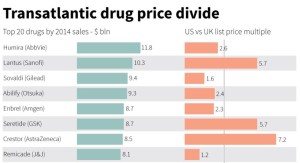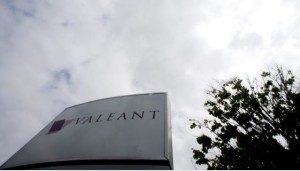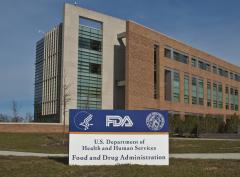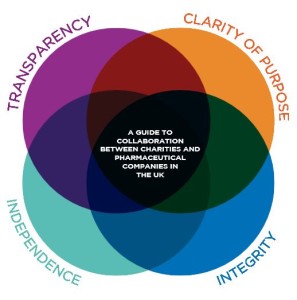- Indian drug manufacturers face higher costs with bar-code requirement (fiercepharmaasia.com)
Small and medium-sized Indian drugmakers are decrying a move by the government to impose new bar-code requirements and say the action shows the government is taking sides with big multinational players to elbow out smaller competition. The larger companies are saying the move is necessary to protect the country's reputation…Pharmaceutical companies in India are now required to establish a "parent-child" relationship with all drugs from Oct. 1, which means a bar code will be used on every drug strip that goes into a unique package…The regulation is an attempt to track the origins of a shipment and to stamp out fake drugs. Indian officials representing the smaller drug companies believe they will be forced out of business because of the requirement.
- Transatlantic divide: how U.S. pays three times more for drugs (reuters.com)Transatlantic drug price divide graphic (pdf.reuters.com)
U.S. prices for the world's 20 top-selling medicines are…three times higher than in Britain… Researchers…also found U.S. prices were consistently higher than in other European markets…The United States, which leaves pricing to market competition, has higher drug prices than other countries where governments directly or indirectly control medicine costs…That makes it by far the most profitable market for pharmaceutical companies, leading to complaints that Americans are effectively subsidizing health systems elsewhere…Manufacturers say decent returns are needed to reward high-risk research…also point to higher U.S. survival rates for diseases such as cancer and the availability of industry-backed access schemes for poorer citizens…Pharmaceutical Research and Manufacturers of America says international comparisons are misleading because list prices do not take into account discounts available as a result of "aggressive negotiation" by U.S. insurers.
- Drugmaker Tactic to Block Generics May Violate Law, FTC Says (bloomberg.com)
Pharmaceutical companies that make minor tweaks to brand-name drugs in order to blunt competition from cheaper generic treatments may be violating antitrust laws, the Federal Trade Commission said…known as "product-hopping," harms consumers who save billions of dollars each year through generic competition and undermines laws that allow pharmacists to automatically substitute brand-name drugs with low-cost copycats, …"Such conduct could deprive generic companies of their most efficient means of distribution -- automatic substitution at the pharmacy -- and, as a result, maintain the brand’s monopoly through illegal means,"
- How the national drug debate is changing the pharmacy benefit business (modernhealthcare.com)
..pharmacy benefit management industry is experiencing subtle changes, and a leadership shuffle at the country's largest PBM has experts speculating about whether PBMs will remain stand-alone companies…More healthcare organizations view prescription drug use as a critical element of keeping patients healthy and reducing costs, and controlling a PBM could help with a population health strategy…"You could see a pathway forward where the PBMs become more integrated with the payers,"...
- Valeant subpoenaed by US prosecutors over drug pricing (reuters.com)Valeant Slumps as U.S. Prosecutors Issue Subpoenas on Prices (bloomberg.com)
Valeant Pharmaceuticals International Inc, under fire for price increases of its two heart drugs, said it was subpoenaed by U.S. prosecutors on its pricing, drug distribution and patient assistance programs…. The company, which came under attack from Democratic lawmakers in late September over "massive" price increases, said it was reviewing subpoenas from the offices of attorneys for the District of Massachusetts and the Southern District of New York…Valeant had tripled Isuprel's price and raised Nitropress price more than six times after buying them in February.
- Ohio prisons officials challenge FDA stand on execution drug (washingtonpost.com)
With two dozen scheduled executions in limbo, Ohio sent a forceful letter to Washington… asserting that the state believes it can obtain a lethal-injection drug from overseas without violating any laws…stopped short of suggesting Ohio is moving forward to obtain the powerful sedative sodium thiopental…the state asked to begin discussing with federal officials about acquiring the substance legally…FDA had warned Ohio in June that importing the restricted drug could be illegal…setting up the latest roadblock that Ohio and several other states have faced in carrying out the death penalty…States have struggled to obtain lethal injection drugs since pharmaceutical companies discontinued the medications they traditionally used or put them off limits for executions…"My sense is that the Food and Drug Administration…was never designed to create an additional impediment to states trying to carry out lawful sentences,"…
- New guide published to support transparent and effective engagement between the pharmaceutical industry and charities (abpi.org.uk)Working together, delivering for patients - A guide to collaboration between charities and pharmaceutical companies in the UK (abpi.org.uk)
National Voices and the Association of the British Pharmaceutical Industry have jointly produced a guide on collaboration for both charities and pharmaceutical companies. The guide highlights the benefits that working together can deliver, alongside some of the issues and risks that all parties need to consider… The aim of the guide is to ensure that such collaborations are more likely to happen, for the benefit of charities, pharmaceutical companies and patients.
- UK healthcare workers back pharma payments disclosure (pharmatimes.com)
..majority of healthcare professionals in the UK support greater transparency on payments received from pharmaceutical companies, but some feel the move could make working with the industry more difficult…87% agreed that payments from pharma to individually named healthcare professionals should be disclosed…32% of healthcare professionals surveyed feel the disclosure of individual payments is unnecessary, while 26% believe that doing so will adversely affect medical innovation… survey results come as pharmaceutical companies gear up to unveil payments and other ‘transfers of value’ …on a publicly accessible database…the new ‘Sunshine rule’, which comes into force next year, NHS staff who fail to disclose perks received from drug companies could face being disciplined, dismissed or even sent to jail for breach of the Bribery Act.
- Increasing Cost of Prescription Drugs: Capitalism should’t be blamed, it must be the government (nevadanewsandviews.com)
We are on the verge of a healthcare crisis in America. It is apparent that the cost of prescription drugs in this country is skyrocketing out of control, and it saddens me that government is at the root of the problem…What we are experiencing today is in no way a failure of capitalism, but rather a failure of government…as it stands, federal government regulations have made it so that pharmaceutical companies can charge whatever they want for…medications, If we really want to lower the cost of prescription drugs in this country, we must allow competition to flourish. This will make it so that all drug companies have to set fair prices in order to compete…
- Why Prescription Drug Price Reform Will Probably Fail (fool.com)
Rapidly rising drug prices have drawn the ire of the American public, who now want reform...reforming the…pharmaceutical industry could prove to be nearly impossible…attempting to change the prescription drug industry could force jobs to overseas markets where price restrictions are deemed less invasive…playing hardball with drugmakers…likely won't work in the U.S...Look what happened with the implementation of the medical device excise tax…Stryker laid off 5% of its workforce, and…Boston Scientific announced a major investment initiative in China around the time the 2.3% medical device excise tax was implemented…imagine what would happen to pharmaceutical jobs and even innovation if the government began curbing drug prices...








